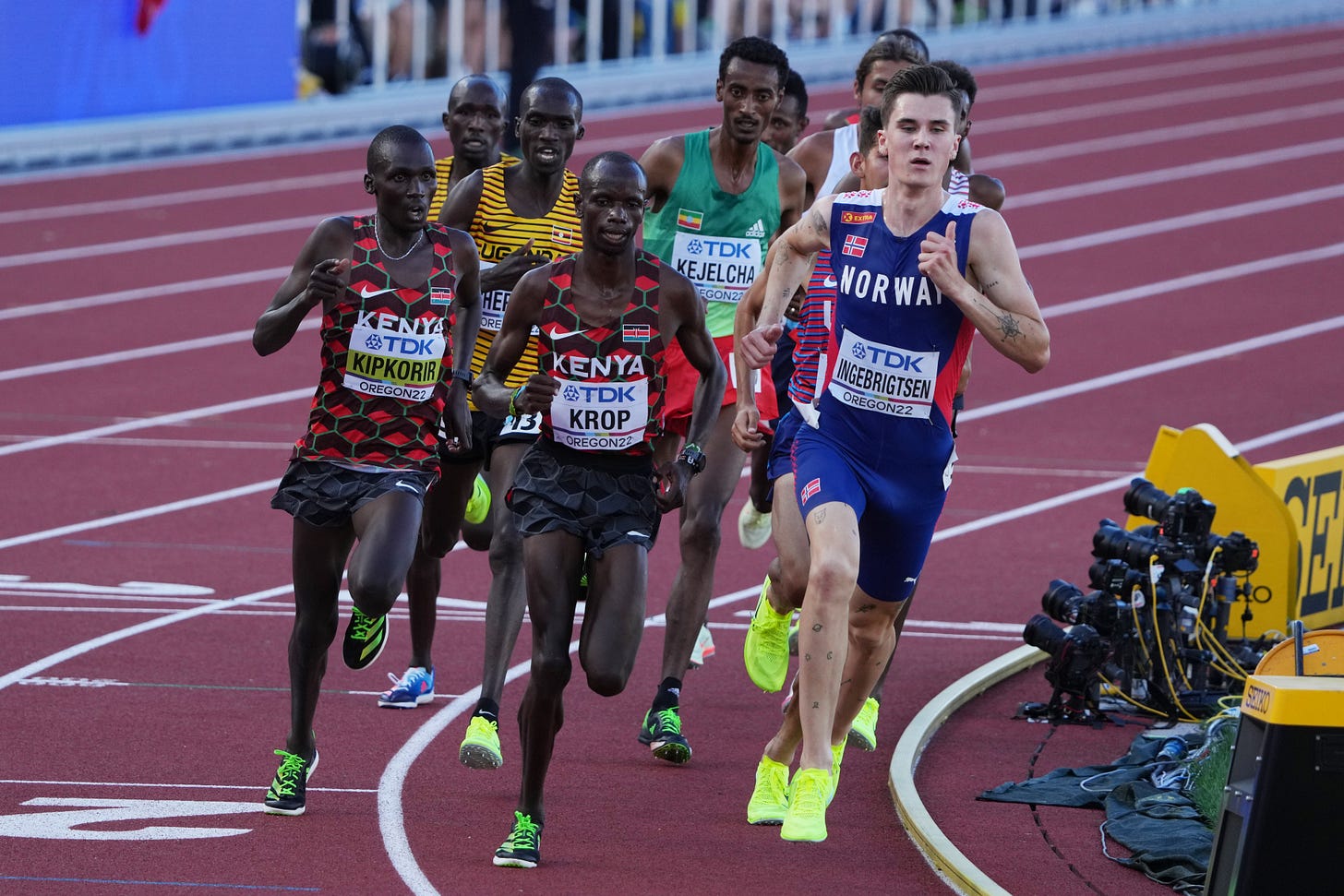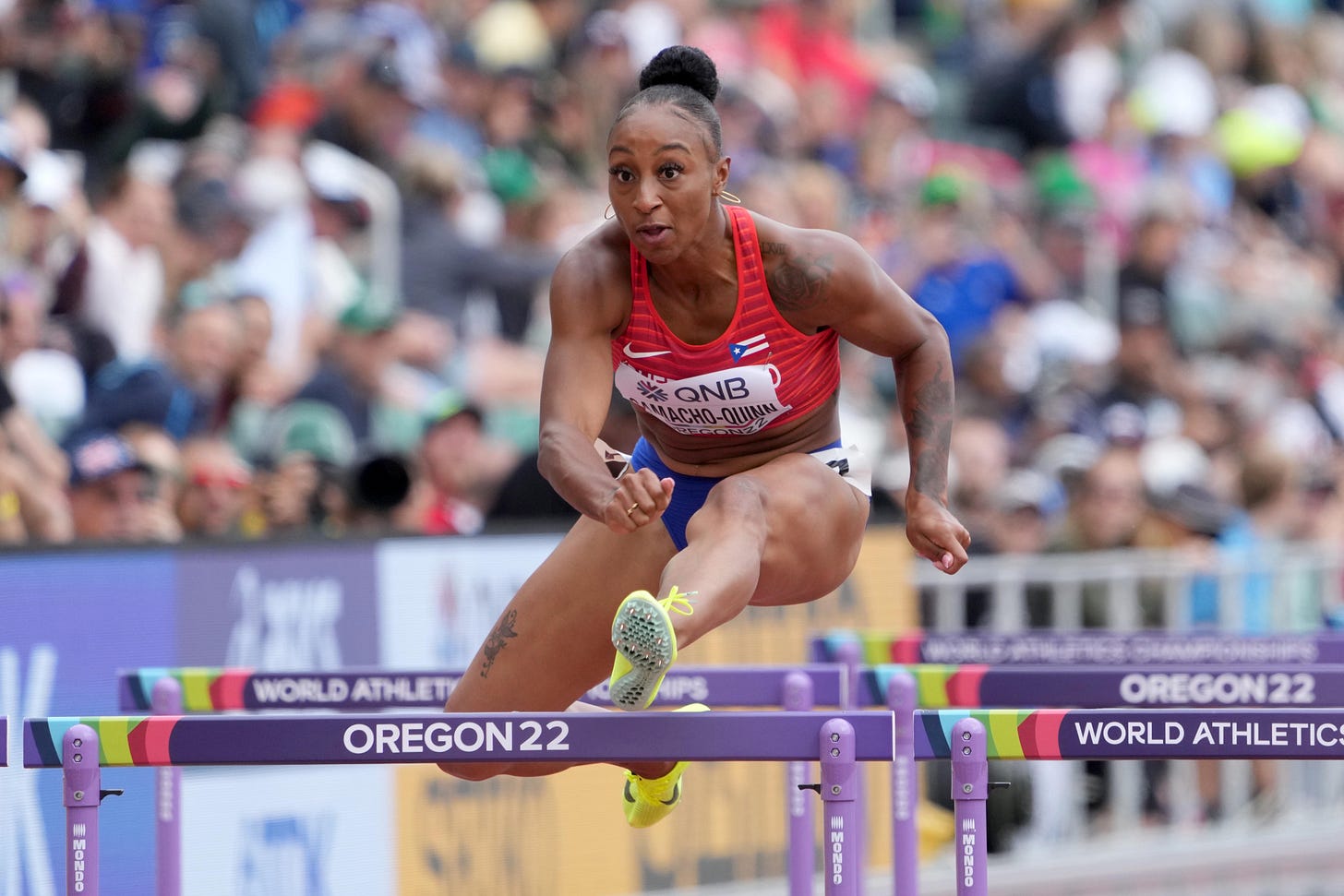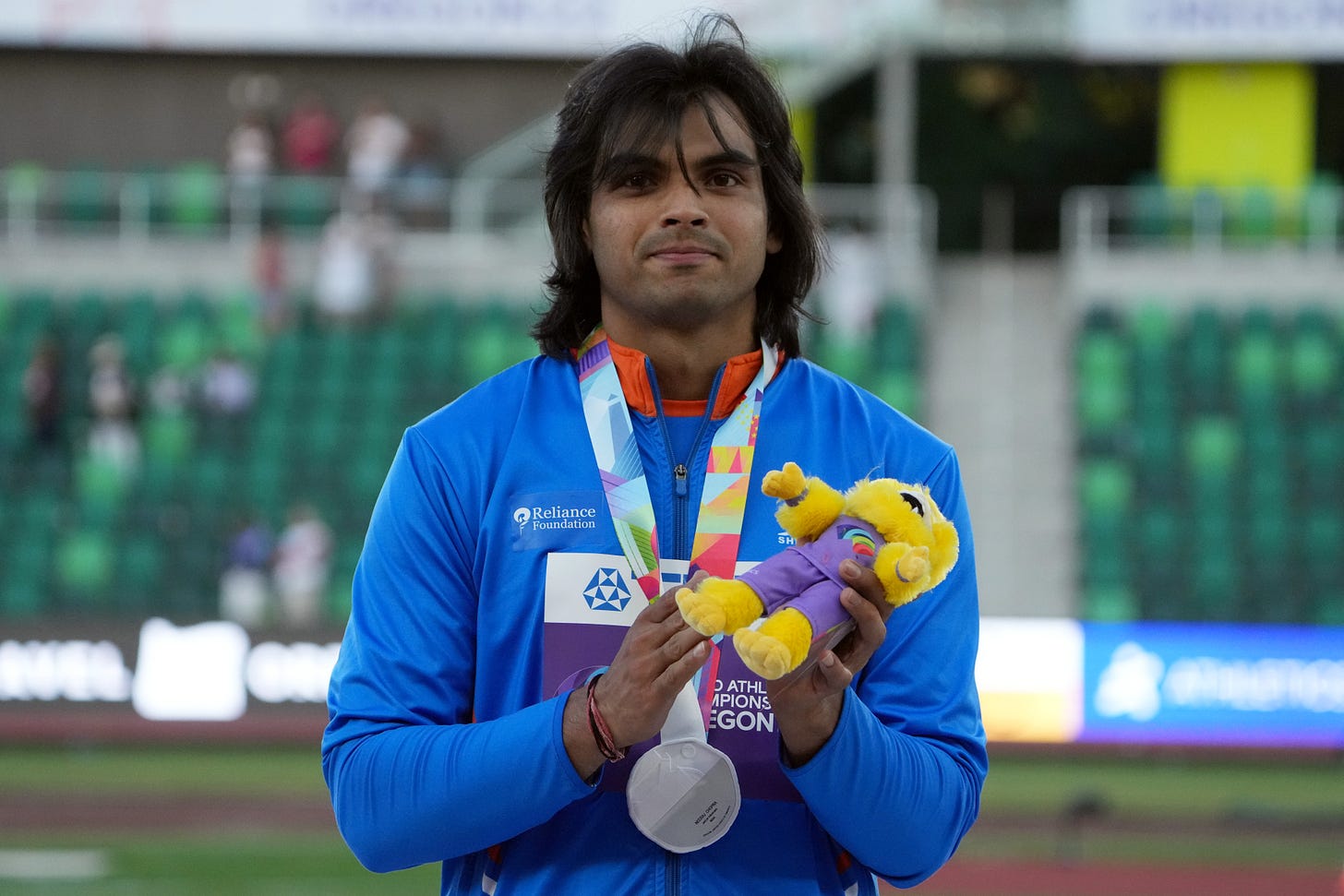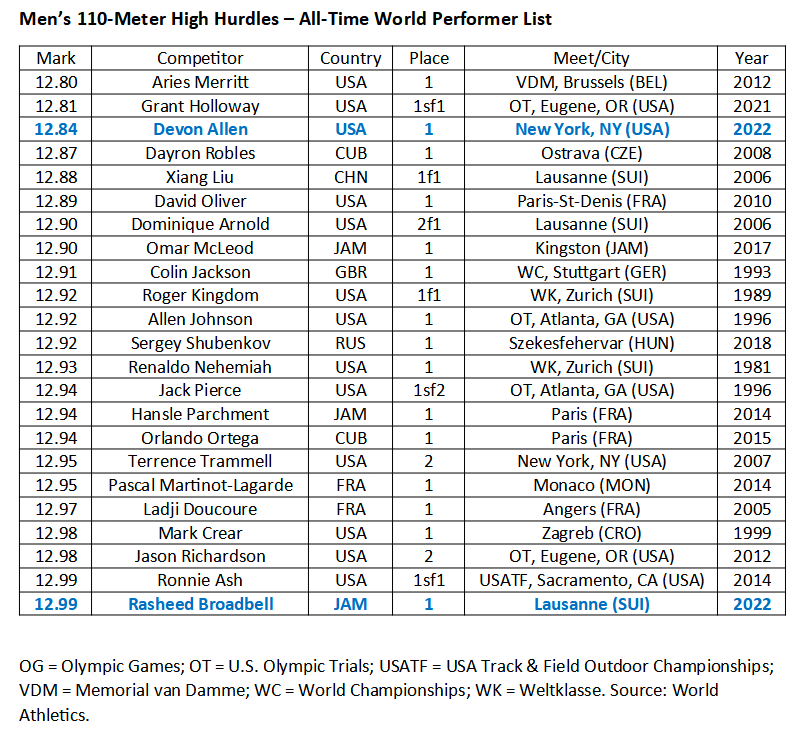Week in Review: A lesson in the art of moving forward after defeat
Ingebrigtsen wins fourth consecutive race after loss in World Championships

Olympic champion Jakob Ingebrigtsen appears to have learned a lesson.
After being upset by Jake Wightman of Great Britain in the men’s 1,500 meters in the World Athletics Championships in Eugene, Oregon, on July 19, the 21-year-old Norwegian has won four consecutive races in dominant fashion.
Ingebrigtsen’s latest victory came in the Athletissima meet in Lausanne, Switzerland, on Aug. 23, when he ran 3 minutes 29.05 seconds in the 1,500 to post the fastest time in the world this year.
“It was a pretty good race,” he said in remarks posted on the meet website. “Luckily, the pacemaker was pushing the first 700 [meters]. The risk was the pace would slow down when he quits, so I had to push and it turned out well.”
Pacemaker Mounir Akbache of France led the field through 800 meters in 1:51.58 before Commonwealth Games champion Ollie Hoare of Australia briefly took over after Akbache dropped out. However, Ingebrigtsen moved to the front of the pack with about 640 meters left and was never seriously challenged after that.
He was followed closely by Hoare and another Australian, Stewart McSweyn, as he entered the home straightaway with 500 meters remaining, but he surged to a five-meter advantage over Hoare with a lap to go.
Hoare began to fade after that and the smooth-striding Ingebrigtsen had a seven-meter lead over McSweyn when he came through 1,200 meters in 2:47.79 after running the third lap in under 56 seconds.
Abel Kipsang of Kenya passed McSweyn midway down the backstretch, but he was unable to keep pace with Ingebrigtsen who ran the third fastest time of his career in winning by more than eight meters.
Kipsang and McSweyn ran season bests of 3:29.93 and 3:30.18 while finishing second and third, respectively, in the race in which four other runners ran under 3:33.
Ingebrigtsen’s time bettered the previous yearly world-leading mark of 3:29.23 that Wightman had run in winning the World title after surging past Ingebrigtsen with 230 meters left in the race.
The Norwegian felt he had made a tactical error in that contest by not pushing the pace hard enough after taking the lead with two laps remaining.
“Unfortunately, I looked at the clock passing 700 so that’s why I didn’t go faster because I thought nobody is going to attack me at this pace,” he said after finishing second in 3:29.47 in Eugene. “I tried to keep an honest pace, but not push it. Looking back, I should have pushed it.”
In the first three finals he ran after that loss, Ingebrigtsen won the 5,000 in 13:09.24 in the World Championships on July 24 after taking the lead with 900 meters to go, won the 5,000 in 13:21.13 in the European Championships on Aug. 16 after moving into the lead with 1,000 meters left, and won the 1,500 in a meet-record 3:32.76 in the European Championships two days later after surging into the lead 30 seconds into the race.
His latest victory in Lausanne was similar to the previous three in that he kept pushing the pace once he had taken the lead. In distance speak, he did not give his opponents time to catch their collective breaths after moving into first place. He kept applying the pressure.
“Overall, I had a good season,” Ingebrigtsen said in Lausanne. “Obviously, I was disappointed in Eugene. There are always things I can do better and it doesn’t always go as expected. For the end of the season and next year I have to put in a lot of work and get faster and break records.”
Add Ingebrigtsen: Despite his relative youth, Ingebrigtsen has already broken 3:30 in the 1,500 five times during his career.
While that figure pales in comparison to the 29 times that Moroccan great Hicham El Guerrouj ran under 3:30, only five other runners have done it more times than Ingebrigtsen. And for what it’s worth, his 3:28.32 personal best is faster than El Guerrouj’s best (3:29.05) when he was 21.
The big question, of course, is will Ingebrigtsen one day top the world records that El Guerrouj currently holds in the 1,500 (3:26.00), mile (3:43.13), and 2,000 (4:44.79).
Inconsistent Hoare: Consistency has not been a strong suit for Ollie Hoare of Australia this year as his season has included outstanding performances, as well as races that have fallen well short of expectations.
On the positive side, the 25-year-old Hoare set an Oceania record of 3:47.48 in the mile while finishing second to Ingebrigtsen’s 3:46.46 in Oslo on June 16, and he won the 1,500 in a personal best of 3:30.12 in the Commonwealth Games in Birmingham, England, on Aug. 6.
In contrast, he was eliminated in the semifinals of the World Championships when he finished 10th in 3:38.36 in his heat, and then came his 12th-place finish in 3:37.81 in Lausanne after he began the final lap in second place.
Welcome to the sub-13 club: Rasheed Broadbell of Jamaica defeated a trio of heavyweight competitors in winning the men’s 110-meter high hurdles in 12.99 seconds in Lausanne.
The time lowered Broadbell’s personal best of 13.08 that he had run in winning the Commonwealth Games on Aug. 4 and gave him a victory over World Championship silver-medalist Trey Cunningham (13.10), two-time World champion Grant Holloway (13.11), and Olympic champion – and countryman – Hansle Parchment (13.13). It also made him the 23rd man – and the third Jamaican – in history to run under 13.00 in the event.
Broadbell, who turned 22 earlier this month, had been eliminated in the semifinals of the World Championships when he finished third in his heat in 13.27. He trailed the typically fast-starting Holloway for the first eight flights of hurdles in Lausanne, but drew even with him over the ninth hurdle before motoring away after clearing the 10th – and final – barrier.
“I’m thanking God right now,” Broadbell said. “I will never forget this race. It’s my first time under 13 seconds and I’m very happy for it. Everyone comes here to do their best, so I just focused on my own race and try to execute what I have practiced in training.”
Consistency personified Trey Cunningham, who won his first NCAA title in the men’s 110-meter high hurdles on June 10 while a senior at Florida State University, has run a slew of quick times this season.
His runner-up performance in Lausanne was the ninth race this season that he has run 13.10 or faster. That is the most by an individual in a season since 2012 when Aries Merritt ran 13.10 or faster 11 times, including a record eight races in which he broke 13.00.
The fastest of those races was a 12.80 clocking in the 2012 Memorial van Damme meet in Brussels that still stands as the world record.
A victory for persistence: Joe Kovacs handed fellow American Ryan Crouser a rare loss in winning the men’s shot put in Lausanne.
The 2015 and ’19 World champion had a best of 22.65 meters (74-3¾) while Crouser, who was recovering from an extended bout with COVID-19, placed second at 22.05 (72-4¼).
In addition to his winning put, the 33-year-old Kovacs had two other efforts of 22.41 (73-6¼) and another put of 22.14 (72-7¾).
Kovacs, who staged a classic back and forth duel with Crouser in the World Championships before finishing second to the world-record-holder and two-time defending Olympic champion, said he was particularly proud of his series.
“It’s important that I throw far consistently and I was able to do that today,” he said.
With a personal best of 22.91 (75-2) from the 2019 World Championships, Kovacs added that topping 73 meters (75-5½) is a goal of his. He said the key to doing so would be to “trust myself and start taking more risks to get it.”
The only three men in history to have topped 73 meters are Crouser, who set his best of 23.37 (76-8¼) last year, Randy Barnes of the U.S., whose best of 23.12 (75-10¼) came in 1990, and Ulf Timmermann of East Germany, whose personal record of 23.06 (75-8) was set in 1988.
Big victory: Jasmine Camacho-Quinn of Puerto Rico knocked off world-record-holder and World champion Tobi Amusan of Nigeria in the women’s 100-meter hurdles in Lausanne.
The 26-year-old Olympic champion ran 12.34 while running into a headwind of 0.9 meters-per-second to turn back Amusan (12.45) and third-place Tia Jones of the U.S. (12.47). World Championship silver medalist Britany Anderson of Jamaica placed fifth in 12.59.
Camacho-Quinn, who finished third in the World Championships, came out of the blocks even with Amusan and began to pull away from her during the last 2-3 flights of hurdles.
“The field was stacked and the girls all have great talent so I was happy to win tonight,” Camacho-Quinn said. “12.3 again is good for me. It’s been a tough year with challenges on and off the track.”

Motoring along: Noah Lyles continued his undefeated season in the men’s 200 meters in Lausanne, although fellow American Michael Norman forced him to come from behind in the final 50 meters of the race for the victory.
Norman, who won his first World title in the 400 on July 22, ran a strong turn and Lyles was unable to overtake him until the final 40-45 meters. However, Lyle’s closing rush was so swift that his 19.56 meet-record clocking was a full two-tenths of a second ahead of Norman’s season best of 19.76.
Commonwealth Games champion Jereem Richards of Trinidad and Tobago finished third in 19.95, with World Championship bronze medalist Erriyon Knighton placing sixth in 20.13 after fading down the stretch.
The 25-year-old Lyles’ time was his third fastest of the season and he now has six of the eight fastest clockings in the world this year.
“I would have taken anything under 19.60, so 19.56 is alright for tonight,” said the two-time defending World champion. “I could have gone faster, but I’m not going to fret much about it.”
Lyles, who ran a U.S. record of 19.31 to win the World title on July 21, said his next race would be the 100 meters in the Internationales Stadionfest (ISTAF) meet in Berlin on Sunday. He figured he could approach a time of 9.70 in the event.
As of today, only three men in history have run 9.70 or faster, and the last to do so was Johan Blake of Jamaica in 2012.
Impressive return: Neeraj Chopra of India won the men’s javelin in Lausanne after missing the Commonwealth Games with a groin injury he sustained while finishing second in the World Championships.
The Olympic champion had a best of 89.08 (292-3) in Lausanne while defeating runner-up Jakub Vadlejch of the Czech Republic (85.88/281-9) and Curtis Thompson of the U.S. (83.72/274-8).
It was the third meet of the season that the 24-year-old Chopra had thrown more than 89 meters (292-0). His farthest toss was a national record of 89.94 (295-1) that placed him second in the Bauhaus-Galan meet in Stockholm on June 30.
“I’m delighted with the result tonight,” he said. “Eighty-nine meters is a great performance. I am especially pleased as I am coming back from an injury and tonight was a good indication that I have recovered well.”

Finishing strong: Femke Bol of the Netherlands set a meet record of 52.95 seconds in winning the women’s 400-meter hurdles in Lausanne.
The silver medalist in the World Championships trailed bronze medalist Dalilah Muhammad of the U.S. for the first six flights of hurdles before pulling even with her at the seventh barriers and leaving her behind after that.
It was the sixth sub-53 effort of the season for the 22-year-old Bol, who won the 400 and 400 hurdles, and ran the anchor leg on the Netherlands’ victorious 1,600 relay team in the European Championships that concluded on Aug. 21.
Janieve Russell of Jamaica finished second in Lausanne in 53.92, with Olympic silver medalist Muhammad placing sixth in 56.03.
Hobbs wins depleted 100: The women’s 100 was one of the most eagerly-anticipated events of the meet in Lausanne, but it lost a lot of its luster when five-time World champion Shelly-Ann Fraser-Pryce of Jamaica pulled out of the event due to what meet management called a “muscle sprain she experienced during her warm-up earlier in the evening.”
The race suffered another blow when two-time defending Olympic champion Elaine Thompson-Herah of Jamaica was disqualified for a false start.
When the race was run, 26-year-old Aleia Hobbs of the U.S. ran 10.87 seconds to edge World Championship silver medalist Shericka Jackson of Jamaica (10.88) and Marie-Josee Ta Lou of Ivory Coast (10.89) for the win. It was the fifth time this season that Hobbs had run under 10.90 in a race that was not wind-aided.
“I had a good start today and know if I start well, I can get great times,” she said. “I’m happy with the 10.87. It’s another sub-10.9 clocking for me.”
Near miss: Alicia Monson of the U.S. came oh so close to pulling off a big upset victory in the women’s 3,000 meters in Lausanne.
The 24-year-old runner, who had placed 13th in the 10,000 in the World Championships, finished second in a personal best of 8:26.81 after being nipped by Francine Niyonsaba of Burundi (8:26.80) at the finish line.
Monson, who led the field through the two-kilometer mark in 5:42.30, had a three-meter lead over second-place Beatrice Chebet of Kenya and a four-meter advantage over third-place Sifan Hassan of the Netherlands entering the home straightaway. But fourth-place Niyonsaba began to close the gap with 60 meters to go and caught Monson inches before they crossed the finish line with the second- and third-fastest times in the world this year.
Monson’s time bettered her previous best of 8:31.62 that she ran indoors this year and was the second fastest outdoor time in U.S. history behind the 8:25.83 clocking set by Mary Slaney in 1985, when the 3,000 was the longest track race for women in global championship competition.
Monson, whose next race will be a 5,000 in the Weltklasse Meet in Zurich on Sept. 7, said it was intimidating to look at all the standout runners on the start list in Lausanne but she believed in her ability and focused on her strategy. “I felt good and that I could go fast. I wanted to get the American record, but maybe another time.”
Runaway winner: Soufiane El Bakkali of Morocco had one of the most dominant performances in Lausanne as he won the men’s 3,000-meter steeplechase by nearly 10 seconds.
The defending Olympic and World champion found himself with a large lead after the second of two pacesetters dropped out of the race with a kilometer to go.
The 26-year-old extended his advantage to more than 50 meters with a lap left and won by more than half a straightaway as his time of 8:02.45 left him well ahead of second-place Hailemariyam Amare of Ethiopia (8:12.07) and third-place Leonard Bett of Kenya (8:12.08).
“I am glad I ran this time in these conditions,” El Bakkali said. “I had to run all alone, but the two pacemakers did a really good job.”
Road warrior: Yalemzerf Yehualaw of Ethiopia continued her superb year on the roads with a victory in the Antrim Coast Half Marathon in Larne, Northern Ireland, on Sunday.
The 23-year-old Yehualaw ran 1 hour 4 minutes 22 seconds to finish 39 seconds ahead of countrywoman Tsehay Gemechu, who ran 1:05:01.
It was the second fastest performance of Yehualaw’s career and tied for the fifth fastest ever run.
The victory follows triumphs earlier this year in which she ran a world best of 29:14 for 10 kilometers in Castellon, Spain, in February, as well as a national record of 2:17:23 in the Haspa Marathon in Hamburg, Germany, in April. It was the fastest-ever debut marathon for a woman.
Jemal Mekonnen of Ethiopia won the men’s race in Larne with a time of 59:04 to finish well ahead of second-place Alfred Ngeno of Kenya, who ran 1:01:00.
Name update: The supremely talented athlete who set a stunning world record of 50.68 seconds in the women’s 400-meter hurdles in the World Championships on July 22 would like to be known as Sydney McLaughin-Levrone going forward from here.
The 23-year-old superstar made that request in a feature story that was published in the Los Angeles Times last week.
The name change comes about following her May marriage to Andre Levrone, a former wide receiver in the NFL.
Schedule released: When the event schedule for the 2023 World Athletics Championships in Budapest, Hungary, was released last week, a lot of fanfare was made about its friendliness to athletes who could double in events such as the 5,000 and 10,000 meters, as well as in the 200 and 400.
However, it will be extremely difficult for someone such as Sydney McLaughlin-Levrone of the U.S. or Femke Bol of the Netherlands to compete in both the women’s 400 meters and the 400 hurdles.
That double will not be as difficult to navigate as it would have been in the World Championships held in Eugene, but it will still require an athlete to run in six races over a period of four and half days.
A performer attempting that double would begin their quest with a first-round heat of the women’s 400 during the morning of Aug. 20. Heats of the 400 hurdles will start at 6:50 p.m., local time, the following evening, with semifinals of the 400 starting at 9:10 that night.
Semifinals of the 400 hurdles will start at 8:25 p.m. on Aug. 22, with the final of the 400 at 9:35 p.m. the next night. The final of the 400 hurdles will be held at 9:50 p.m. on Aug. 24.
Personal note: Saturday, Sept. 3, will mark the 50-year anniversary of one of the greatest men’s 10,000 meters races ever run.
It will be a special memory for me because that race, which was won by Lassen Viren of Finland, was one of the highlights of the track and field competition held during the 1972 Olympic Games in Munich.
As I wrote in a first-person story in March, I was a fan of the NFL, NBA, and Major League Baseball – in that order – at that point in my young life. But I got hooked on track and field while watching ABC’s televised coverage of the Olympics here in the U.S.
Although American swimmer Mark Spitz was the individual star of those Games when he won what was then a record seven gold medals, there was something about track and field that was more compelling to me than any sport I had ever watched.
Whether it was the incredible come-from-behind victory by Dave Wottle of the U.S. in the men’s 800, the athletic grace and beauty that John Akii-Bua of Uganda displayed in winning the men’s 400 intermediate hurdles in a world-record time of 47.82 seconds, or the look of amazement on the face of long jump champion Heide Rosendal of West Germany after she had held off the favored East German team on the anchor leg of the women’s 400 relay, I was smitten by a sport that much of the world refers to as athletics.
However, Viren’s victory in the 10,000 really made an impression on me as he set a world record of 27:38.4 after falling to the track near the midway point of the race after running too close to Belgian Emiel Puttemans.
The 23-year-old Finn could have panicked after crashing to the track, but he bounced up quickly, set off in pursuit of the leaders, and eventually took the lead for good with a lap and a half remaining while running the final kilometer in 2:29.0, last 800 in 1:56.6, and final 400 in 56.6 while leading the greatest mass finish in history.
In addition to Viren’s world record, Puttemans finished second in 27:39.6, then the third-fastest time ever run.
Miruts Yifter of Ethiopia, who would win the 5,000 and 10,000 in the 1980 Olympics in Moscow, finished third in 27:41.0, the fourth-fastest time ever. He was followed by Mariano Haro of Spain, whose 27:48.2 effort was the sixth-fastest of all-time, and Frank Shorter of the U.S., who ran 27:51.4 for the eighth-fastest time in history.
Viren would go on to win the 5,000 meters in Munich and repeat his victorious double in the Games in Montreal four years later. But none of those performances enamored me the way his first Olympic victory did.
That run in Munich got me hooked on track and field and has led to a 50-year romance with a sport that has its flaws but I still find as compelling as ever.






Thank you - such an in-depth look at that week in T & F!